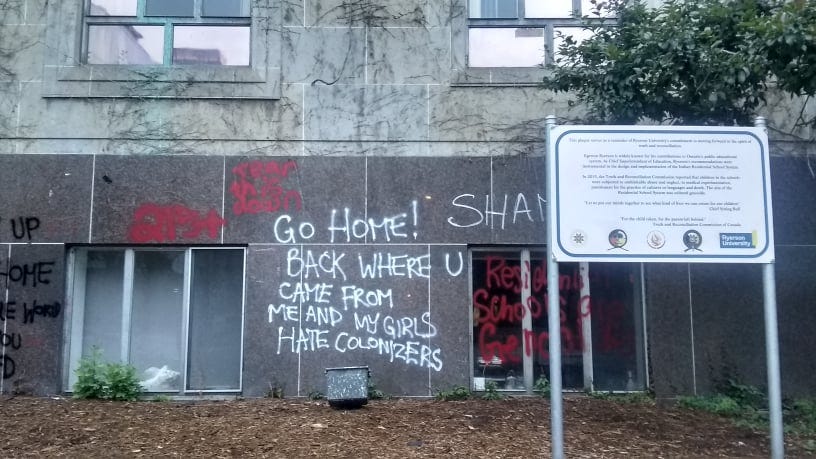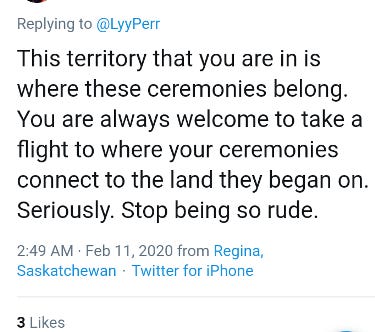Solidarity across differences - or do we go separate ways?
I was crossing the Ryerson campus the other day when I spotted this graffito where the Ryerson statue used to be, perhaps addressing all who’ve come to these shores over the centuries:
It’s an interesting tension in Canadian progressive politics, and I’m seeing it only occasionally expressed. It can be seen in this story of screenshots from the Kwantlen Polytechnic email exchanges about Canada Day, where the immigrant staff defended the idea of Canada against the old settlers’ disdain. I am personally beginning to encounter it as well. This is my tweet from Canada Day:
What follows is the response from someone I don’t follow, nor he me.
I’ve hidden his handle because I’m a little embarrassed for him, to be honest. He grew up here, in Canada, and today draws a six-figure salary from that pillar of colonialism and Christian education, the University of Toronto, while playing an anti-colonialist activist for his 20,000+ Twitter followers. He spent his early July holiday searching for people who have typed “happy Canada Day” so he can tell them they should be ashamed of themselves? To each their own, I guess.
I’ve encountered this ideological tension more openly last year in a tweet from someone who’s part Indigenous (but full-on Indigenous sovereignty activist) after I wondered on Twitter why a secular public event such as a theatre season announcement should start with a 10-min smudging ceremony.
This stayed in memory because I’ve never been told before, in my 20 years in Canada, to go back where I came from. I’m sure there’ve been people who thought it. But to say it in a public forum, under your own name — and get some approval for it from Canadian progressives — is another matter.
I should not have kept this screenshot, I know, but I think the attitude is part of a wider, more important question. I predict that we are less than a year away from some of the ‘Indigenous sovereignty’ activists adopting the anti-immigration stance openly. Immigrants and refugees who become citizens are considered settlers now too, in this universe, and inherit the collective sin of the older settlers by virtue of taking up the space on the land, taking the citizenship, and with it the allegiance to the head of state and the Canadian laws. The anti-immigration sentiment is already popping up here and there, as my examples show, but it will have to be articulated more clearly because it comes from a knotty spot in the Canadian woke worldview which will have to be resolved. The notion that one ethnicity has a special relationship to the ‘land’, special talent for stewardship, special, instinctual? knowledge of it and of the preservation that won’t fit the boring old fishing and hunting quotas for everybody else: that is a philosophical view that cannot fit with the one that invites 200,000 people of all ethnicities from around the world to the country, under the promise of an equal, non-race-based citizenship. Something will have to give. (That same woke worldview of the fundamental Indigenous difference will expect of Indigenous artists to create folk art only, and write fiction about their own ethnicity ad infinitum.) Here’s how the conversation between the two models would go, if we still had free conversations:
> Indigenous sovereignty activists: We all come in ethnic groups which are separable; there are things we can’t bridge, things we can’t reconcile. We must arrange our society around this division, this border, not trying to find what unites us.
Immigrants for the ethnicity-agnostic citizenship: We all come from ethnic groups with unequal and varied histories but are not limited by them. We can talk, befriend, work, collaborate, marry, vote, socialize, read, consume across those borders.
> ISA: Laws and regulations and child welfare etc. should be separate where necessary.
IEAC: We should all roughly share the same liberal democratic playbook, though its borders can be fuzzy with exceptions; to what degree is a conversation. If legal apartness is introduced, we are diminished as a collective. We should all be included in the national project. It’s a better way to live together (and in Canada with all this space, it’s always only notionally together anyway) instead of balkanizing.
> ISA: Our greatest value is repairing historical injustices to groups & their spokespeople.
IEAC: Our greatest value is the individual and her freedom, which presumes the safety, rooting, growth, which presumes belonging to various groups and collectives and also not being limited by them.
> ISA: We do not recognize Canada and its colonial institutions. But we will take money from it without qualms, beside the regular treaty annuities. Canada owes us all the money and all the resources. We will accept the bureaucratic rules of establishing if someone is of Indigenous ethnicity because that’s the only way we can access these resources and especially reserved jobs and positions in institutions so we can transform them. It’s a short term concession for along term gain.
IEAC: Huh? How do you not see this as a contradiction? Why don’t you advocate for a wholesale separation, like Quebec nationalists used to? A ton of separatist artists in Quebec for ex. refused federal government funding for their projects… Or do you think Bloc Qubecois, which has no problem accepting MP salaries, is the way to go?
> ISA: We welcome immigrant settlers to our shores. It doesn’t matter what ethnicity you come from. But only one ethnicity is fundamentally different from all the others, because it was here first. Every attempt to question this is forced assimilation.
IEAC: …*withdraws silently*
Etc.
Had some of these activists read the notorious Mark Hecht op-ed which got him unpublished and cancelled a couple of years ago, they actually would not have found that much to disagree with the gist. The gist was: too much ethnic & religious diversity through immigration weakens the social bonds among those already here. How will the results of the massively diverse, ethnically-agnostic immigration from all sides of the world work within the model of Canadian citizenship that’s forming around the settler and indigenous dividing line, the two main demographic blocks that are here already?
Another thing that I’ve noticed as of late is that even questioning the concept of parallel citizenship and parallel laws is now beyond the pale in Canada. When even the conservative National Post columnists are retroactively OUTRAGED by Pierre Trudeau’s mad suggestion that as a country perhaps we can look at one equal citizenship for all - things have shifted significantly. The A-word is bandied about without care or definition. Everything but parallelism is assimilation? Culture-wise, it’s a very old question for all non-constitutive ethnic groups in Canada, but that’s not it, we are told, this is different.
And this self-balkanization is I think a uniquely Canadian obsession (New Zealand is a little less down that path, where the Maoris have granted the entire nation the haka for the All Blacks rugby team, for ex). US has no obsession with how it’s treated its indigenous population — and you could argue the US was harsher than Canada. But the US created the mythology of the Wild West, which is known around the world – and which made the North American Indigenous cultures world renowned. We will fight you brutally, we will decimate you, but you’ll forever have a place in our national dream factory pantheon, type approach? I’ve mentioned this episode of the Rest is History before, in which two British historians dissect the Wild West and joke that Canada was a place so boring that even Sitting Bull on the run after the battle at Little Bighorn didn’t want to stay there more than absolutely necessary. (The actual story of Sitting Bull in what would be Saskatchewan is a little bit different.) There is this great CBC doc about the German obsession with North American Indigenous cultures which shows that some of this fandom in the twentieth century was fed by the (Aryan) fantasy of the pre-contact, pre-modernity purity not found anywhere else – but the Native American cultures are known around the world chiefly thanks to the planetary power of the US cultural empire which disseminates like no other force. So, things are complicated. And while Canada has had some excellent popular novelists (eg Thomas King) and art house cinema (Atanarjuat) and TV shows (North of 60 was a favourite in Yugoslavia in mid 1990s), more people will have seen AMC’s The Terror which brazenly and without the approval from any cultural sensitivity committee puts Inuit culture inside an exciting piece of TV drama about the North-West Passage. Or John Ford films like The Searchers. Or Dances with Wolves. Or would have read Louis L’Amour.
Some of the largest Canadian cultural organizations that decided not to celebrate Canada Day this year did, through their social media, congratulate the neighbours to the south July 4. (The TSO, for example.) July 4 is more politically correct, somehow, though the US too had church-led residential schools, and unlike Canada, genuinely did have the melting-pot, republican citizenship policies. How do Canadians square this in their minds, is a mystery to me. Is it that we’re so deeply Americanized, give us any reason to dismiss Canada?
Well, you now have immigrants around to mess up your new narrative, Canada, because you once thought them fundamental to your project. Oops. We have lived in at least two countries, speak at least two languages, know our history and can compare and deduce. We will practice our citizenship. Sorry! x






